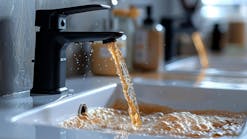Water Quality: A Selling Point
Private wells are largely unregulated, and the task of ensuring safety is usually left up to the homeowner. A handful of states have regulations requiring a water test on a private well when the property is sold or a new well is drilled. While not every state has regulations, there may be testing requirements at the county or township level for real estate transactions or certificates of occupancy.
Testing Options
When testing is required on a private well, it is commonly referred to as a potability test. Often, this means testing the water for bacteria. While bacteria is a concern in private wells, it should not be the only concern. There are many contaminants that can be present in well water that can adversely affect human health.
Unlike iron and hardness, many of these contaminants do not make themselves known in obvious ways, and without testing there is nothing to indicate their presence. When purchasing a home with well water, it is up to the seller to comply with regulations, but the buyer may request that additional testing be done.
Before purchasing a home, people often hire home inspectors to determine if there are any major problems. If there are problems uncovered, the buyer can negotiate having repairs done prior to the sale or a reduced price to cover the cost of repair. This is the time when a water test would be appropriate. Most people would defer to the regulations and only test for bacteria. Additionally, testing for certain contaminants can take several days, and many homeowners forgo this due to the rush of a house closing.
Easy Fix?
The unfortunate thing about this is that bacteria are commonly found in wells and it is a common remedy to dump some chlorine down the well. Most health departments recommend homeowners use household bleach, and recommended amounts vary from a quart to several gallons. There are a few problems with this practice.
First, far worse things than bacteria can be present in well water, so a more comprehensive test should be done and it is up to the buyer to demand it. Purchasing a home is a large investment and making sure the water supplied to a potential home is safe should be a priority.
Second, if there is bacteria present, one can certainly treat using chlorine, but it is best to have the well inspected, as the bacteria could be a result of an improper well seal, cracked casing or other physical defect. If one simply treated the bacteria without finding the cause, the problem could easily return.
Third, household bleach is not intended for contact with potable water. Household bleach can contain trace amounts of other contaminants, which may be unintentionally added to the drinking water. It is important to use chlorine that has been approved for use on drinking water supplies.
Finally, it is important to calculate the amount of chlorine needed to treat the supply. Chlorine is considered a carcinogen, so using too much is not healthy; however, using too little can be ineffective against bacteria. Once the water has been treated, it should be retested to ensure the problem has been resolved.
While treating the bacteria with chlorine is an easy and cost-effective fix, if the source of the problem is not identified and addressed, the bacteria problem will return. Installing a more permanent solution such as a continuous chlorinator, ultraviolet light or ozone can add to the value of a home, assuring buyers that the water is microbiologically safe.
More Extensive Testing
In addition to testing for bacteria, other contaminants should be considered. Some naturally occurring contaminants such as arsenic or radium are known to occur in certain parts of the country because of geological formations in the area. While it is smart to test for contaminants that are known to occur in an area, one may also want to test for things like volatile organics to prove that they do not exist in the water supply.
Beyond Testing
Let’s face it—in real estate today it is a buyer’s market and there are many homes for sale, so buyers have many choices. The seller now has a bigger responsibility to set their home apart from the many on the market. For homes with well water, one way to set the property apart is with water quality.
The water should be tested to determine its quality. It is important to have the water tested periodically, as its quality can change over time. Having water test reports from the time the property was occupied provides prospective buyers proof of the water quality. The water test reports can either indicate the water is safe without any treatment or it can indicate water treatment is necessary. If the report indicates that treatment is necessary, have the appropriate equipment installed so buyers can see that not only is the home well maintained, so are the property and resources.
Imagine you are buying a home and you have found two that would meet your basic requirements, both with well water. One home has the water tested annually with several reports and a simple water treatment system and the other home was just recently tested for bacteria. Which home would you be more comfortable purchasing?
Educating homeowners who are looking to sell about the importance of water quality can help them set their homes apart from the others on the market. Because new homes construction has declined significantly, water treatment professionals can focus their efforts on homes with well water that are currently on the market. Now is a good time to forge relationships with local realtors who are open to suggestions and help to move properties.
Download: Here


